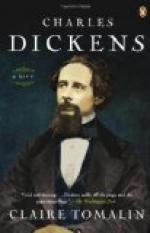The results justified the care and effort bestowed. There are, speaking generally, two schools of readers: those who dramatize what they read, and those who read simply, audibly, with every attention to emphasis and point, but with no effort to do more than slightly indicate differences of personage or character. To the latter school Thackeray belonged. He read so as to be perfectly heard, and perfectly understood, and so that the innate beauty of his literary style might have full effect. Dickens read quite differently. He read not as a writer to whom style is everything, but as an actor throwing himself into the world he wished to bring before his hearers. He was so careless indeed of pure literature, in this particular matter, that he altered his books for the readings, eliminating much of the narrative, and emphasizing the dialogue. He was pre-eminently the dramatic reader. Carlyle, who had been dragged to “Hanover Rooms,” to “the complete upsetting,” as he says, “of my evening habitudes, and spiritual composure,” was yet constrained to declare: “Dickens does it capitally, such as it is; acts better than any Macready in the world; a whole tragic, comic, heroic, theatre visible, performing under one hat, and keeping us laughing—in a sorry way, some of us thought—the whole night. He is a good creature, too, and makes fifty or sixty pounds by each of these readings.” “A whole theatre”—that is just the right expression minted for us by the great coiner of phrases. Dickens, by mere play of voice, for the gestures were comparatively sober, placed before you, on his imaginary stage, the men and women he had created. There Dr. Marigold pattered his cheap-jack phrases; and Mrs. Gamp and Betsy Prig, with throats rendered husky by much gin, had their memorable quarrel; and Sergeant Buzfuz bamboozled that stupid jury; and Boots at the Swan told his pretty tale of child-elopement; and Fagin, in his hoarse Jew whisper, urged Bill Sikes to his last foul deed of murder.




